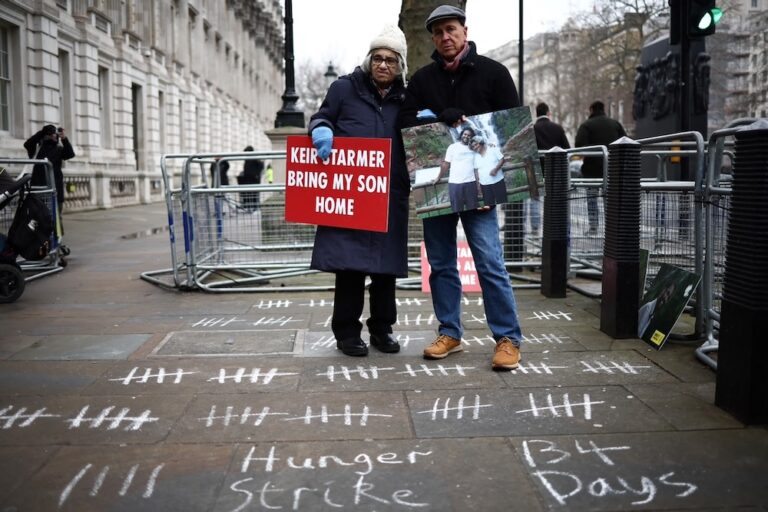Mozn Hassan has received praise and international accolades for refusing to separate politics from feminism. And that's something the Egyptian government will not forgive easily.
“We’re not this nice acceptable women’s organisation, we’re not a development-only [organisation]. We think the feminist movement is a political movement. We’ve always had a human rights perspective.”
In 2007, along with ten other young Egyptian activists, Mozn Hassan established Nazra for Feminist Studies, a now leading – and threatened – women’s rights organisation in Egypt. Nazra’s main goal is to nurture young feminists and to contribute to the development of a strong Egyptian and regional feminist movement in the Middle East and North Africa.
Over the years, with Hassan at its helm as executive director, Nazra has organized events and programs aimed at strengthening a woman’s position in Egypt both socially and politically, and provided a range of legal and psychological support. Since its founding, Nazra has helped a number of feminist groups across Egypt. Through its Women’s Political Participation Academy, it mentors female candidates from across the political spectrum to run in parliamentary, municipal, and union elections.
In 2011, as mass protests calling for the fall of then-president Hosni Mubarak rocked the streets of Egypt, Hassan and her colleagues were in Tahrir Square, day and night. In the first days of the revolution, it was not yet apparent how vital Nazra’s work would become. But as incidents of mass sexual harassment and violence against women in the streets became a widespread phenomenon, both during and after the public protests, Nazra stepped in. The organisation coordinated a three-pronged approach along with partners and grassroots organisations, offering medical, psychological, and legal support to the victims. It continues to run an emergency hotline for survivors of sexual assault, and its legal team has taken certain cases to court, scoring some victories for the defendants – and for women’s rights in general.
In 2013, Egypt was ranked the worst country for women’s rights in the Arab World. That same year, Nazra launched annual Feminist Schools, to educate young Egyptian men and women about personal freedoms and gender issues. The schools often take up issues considered taboo in Egypt.
Post-revolution, as the country began its process of rewriting the Constitution, Nazra, as part of a coalition of women’s rights groups, played an important role in ensuring the inclusion of passages protecting women’s rights. It also lobbied successfully for amendments to the Penal Code to include clauses on sexual harassment and to expand the definition of sexual crimes.
By early 2016, hope and excitement over any achievements realized in the immediate aftermath of the revolution had all but disappeared. Former army general Abdel Fattah el-Sisi had become president, ushering in an era of unprecedented suppression of opposition and dissent. Not long after, civil society groups became the prime targets in Sisi’s alleged war on terrorism. As part of the ongoing crackdown on civil society known as the ‘foreign funding case’, in March 2016 Egyptian authorities launched an investigation against Nazra, largely focussing on Hassan herself. Forty other Egyptian organisations were also investigated as part of this case, including IFEX members the Arabic Network for Human Rights Information (ANHRI) and the Cairo Institute for Human Rights Studies (CIHRS).
In a pattern similar to that imposed on other human rights defenders in Egypt, Hassan was first summoned to appear before an investigative judge at the New Cairo Court, on 29 March 2016. Three months later, as she was attempting to board a flight to Beirut from Cairo International Airport, she was informed of a travel ban forbidding her from leaving the country.
In September 2016, Hassan and Nazra were awarded a Right Livelihood prize – often referred to as ‘the alternative Nobel’ – “for asserting the equality and rights of women in circumstances where they are subject to ongoing violence, abuse and discrimination”. Given the travel ban, Hassan was unable to accept the award herself.
On 11 January 2017, the Cairo Criminal Court ruled to freeze Hassan’s personal and organizational assets. If Hassan and others in the case are found guilty of illegally receiving foreign funding, they face up to 25 years’ imprisonment.
In the face of this reaction to her work as women’s rights defender, humanitarian, and activist, Hassan remains defiant. In a 2016 interview with the Financial Times, she said “If you believe in this kind of work, you also believe that you are not the first one [to struggle], and you will not be the last.”



